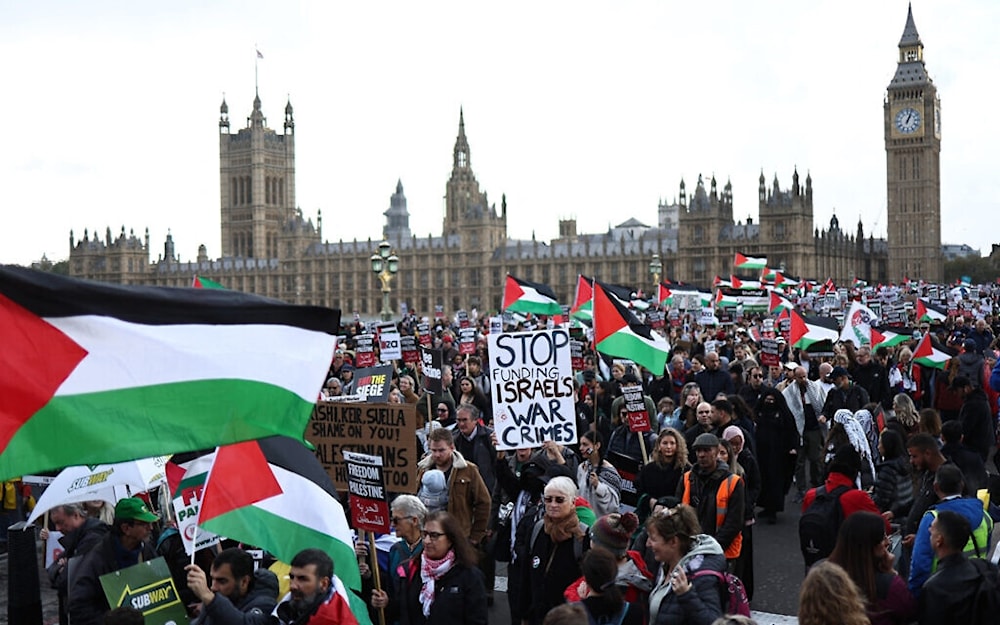UK to 'broaden' definition of extremism amid pro-Palestine rallies
A Whitehall official expresses concern “that this is a crackdown on freedom of speech. The definition is too broad and will capture legitimate organisations and individuals.”
-

Pro-Palestinian, anti-Israel protesters walk over Westminster Bridge, near the Houses of Parliament, during a 'March For Palestine' in London on October 28, 2023. (AFP)
According to documents seen by The Observer, UK officials are proposing to broaden the definition of extremism to constitute anyone who “undermines” the UK's institutions and values - unsurprisingly amid pro-Palestine protests in London.
Prepared by staff working for cabinet minister Michael Gove, the definition is strongly opposed by a group of officials who truly fear legitimate groups and individuals will be labeled as extremist, and it has already prompted a furious response from civil rights groups saying it risks “criminalizing dissent”, and significantly oppress freedom of expression.
A Whitehall official expresses concern “that this is a crackdown on freedom of speech. The definition is too broad and will capture legitimate organizations and individuals.”
Meanwhile, civil rights groups argue that widening the definition of extremism is due to threaten freedom of speech.
Read next: UK threatens to expel expats who support the Palestinian resistance
Gove’s Department for Levelling Up, Housing and Communities has already begun a review of non-violent extremism back during the spring, and a national cohesion and counter-extremism outline with the new definition is anticipated to be announced shortly.
'Reckless and cynical'
Internal departmental documents categorize a list of organizations the department considers to be “captured” by the new definition - among them are the Muslim Council of Britain (MCB), Palestine Action and Mend (Muslim Engagement and Development).
The "official-sensitive" marked documents state, “Extremism is the promotion or advancement of any ideology which aims to overturn or undermine the UK’s system of parliamentary democracy, its institutions and values.”
The Home Secretary, Suella Braverman, described pro-Palestinian protests in London last week as “hate marches”, as the government vows to provide "Israel" with weapons that are killing children. UK Immigration Minister Robert Jenrick announced that the UK will not call for a ceasefire in the Middle East as it supports "Israel's right to self-defense".
Akiko Hart, interim director at Liberty, expressed, “This proposed change would be a reckless and cynical move, threatening to significantly suppress freedom of expression”.
Hart added: “Expanding the definition so far beyond the current guidance risks further discouraging individuals and groups from legitimately exercising their right to free speech, while allowing the government to crack down on community groups, charities or faith groups they disagree with.”
Martin Bright, editor-at-large of Index on Censorship, claimed, “This is an unwarranted attack on freedom of expression and would potentially criminalize every student radical and revolutionary dissident. It has never been the British way to arrest people for thought crime.”
Read next: UK gov. restricts local media coverage of SAS ops. in Gaza
Amnesty International UK’s Racial Justice Director, Ilyas Nagdee, said, “This definition must not be accepted or implemented,” adding that the definition is being applied so broadly that “it seeks to effectively hinder people from organizing and mobilizing. The proposed definition takes this even further and could criminalize any dissent.”
Fearing freedom of speech
Extremism, under the UK's 2011 Prevent strategy, was defined as the “active opposition to fundamental British values, including democracy, the rule of law, individual liberty and the mutual respect and tolerance of different faiths and beliefs”.
The suggested definition in the documents states it is the promotion of any ideology which aims to “overturn or undermine the UK’s democracy, its institutions and values; or threaten the rights of individuals or create a permissive environment for radicalization, hate crime and terrorism”.
It notes that the definition should be supported with public guidance that leads to “consistent use and application” and that “stakeholders have thus far agreed this sets a clear threshold for identifying extremism”.
It also involves, “Sustained support for, or continued uncritical association with organizations or individuals who are exhibiting extremist behaviors.”
Breaking: 🇬🇧📍 massive Pro-#Palestine protest in London condemning the genocide that’s being happening by #Israel#StopGazaNakaba #Gaza_under_attack #غزة_الآن #Gazagenocide #FreeGaza #TheRealImage #IsraeliWarCrimes #IsrealPalestineconflict #hamas #Gaza pic.twitter.com/0hMg2aY4NK
— ANDREW FORSBERG 🇬🇭🇸🇪 (@akillis21) October 14, 2023
A government spokesperson argued: “We are clear there is no place for extremism, and over the last few years we have taken action to tackle hatred and those who seek to divide us... As you would expect, we keep our approach to tackling extremism under review to ensure it meets the evolving challenge it poses.”
This comes a week after the head of the Metropolitan police, Commissioner Mark Rowley, declared that his forces would be “absolutely ruthless” during pro-Palestine protests, but said prosecutions would only happen when the law is broken.
During his interview on Sky News’ Trevor Phillips On Sunday show, Rowley claimed that “many more” arrests are due in the coming weeks.
“We will robustly enforce up to the line of the law,” he said, adding: “We’re going to be absolutely ruthless and we have been and you’ll see many more arrests over the next week or so.”

 5 Min Read
5 Min Read








